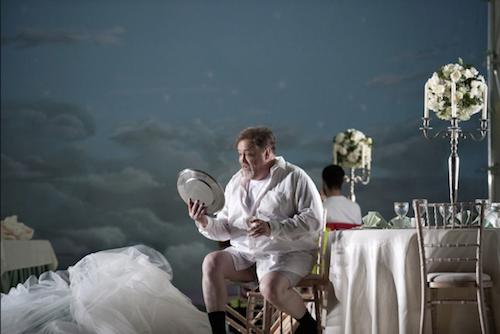© Clärchen & Matthias Baus
Amsterdam; September 9, 2015
DNO celebrates anniversary with bland ‘Der Rosenkavalier’
MUSIC
1. Is DNO true to the music or are there changes?
– The National Opera (DNO) celebrates its 50th anniversary with again a new staging of the opera ‘Der Rosenkavalier‘ by Richard Strauss (1864-1949). There are many unnecessary cuts that absolutely do not make the opera much shorter. ***
2. Are the singers suited for their roles?
– The soloists are permissible, but not exceptional. Paula Murrihy is too feminine in her acting and phrasing as the young man Octavian and does not erase the impression that Karin Strobos made at DNO four years ago. Camilla Nylund is a lyrical Marschallin, but not aristocratic, not distinguished, not nostalgic, not melancholic and Hanna-Elisabeth Müller as a lyric Sophie doesn’t offer in terms of sound a great contrast with her. Peter Rose isn’t Viennese as Ochs, but very understandable in his Sprechgesang. Yosep Kang as the Italian singer cracks five times in his aria. Irmgard Vilsmaier is a great Marianne Leitmetzerin with in the format of Brünnhilde and Martin Gantner demonstrates that Faninal a Heldenbariton. ***
3. Is the conductor involved in the stage?
– Conductor Marc Albrecht is a metronome for singers “und weiter nichts”. **
4. Is there a uniformity among the (choral and) orchestra members?
– From the Nederlands Philharmonisch Orkest no Viennese ‘Der Rosenkavalier’ can be expected. The tempos are fast and prosaic – it is with 190 minutes one of the fastest performances of ‘Der Rosenkavalier’ – and the waltzes often develop to barrel organ music. The orchestra is more than once unequal. **
DRAMATURGY
5. Does the staging correspond to the libretto?
– DNO assigned the staging of this anniversary production to the unknown, young director Jan Philipp Gloger. Gloger is no comic talent. ‘Der Rosenkavalier’ is sincere and serious, but barely offers moments to laugh. This mise-en-scene – the first act situated in the country house of the Werdenbergs, the second act in a party tent and the third in a motel – shows little verve, but the libretto reconciles itself with it. ***
6. Is there a story told?
However, Gloger is a good storyteller and makes the story of ‘ Der Rosenkavalier ‘ clear. For example, it was a clarifying find to dress up Leopold – the illegitimate son of Ochs – in the same fashion as his father. ***
7. How is the integration direction – music?
– The Marschallin and Ochs in underwear, fast food, overly queery hairdressers, there are many vulgar and everyday moments in the staging where the music absolutely does not ask for it. And Mohammed is – politically correct – a white male … **
8. How are the aesthetics and functionality of the design?
– This ‘Der Rosenkavalier’ does not possess a lot of charm, but charm, elan and elegance are features, which one should nowadays no longer expect in opera productions. But is ‘Der Rosenkavalier’ with its charming music then the best opera to chose for a company if one doesn’t want a charming mise-en-scene? Apart from that, the staging is not always completely visible from many parts of the hall. **
GENERAL
9. Is the production artistically innovative?
– The staging is solid, but bland. **
10. Is the production distinctive or controversial?
– As an anniversary production DNO had better once again had called upon ‘Der Rosenkavalier‘ of Decker/Fassbaender. **
11. Is there any Dutch involvement in the production (singers, director, designers, conductor)?
– There is a contribution of Dutch talent. Mark Omvlee and Morschi Franz are the Haushofmeisters of respectively the Marschallin and Faninal. And choir members of DNO sing the lackeys, waiters, noble orphans, the servant, the milliner and the vendor of pets. ****
12. How is the number of visitors in relation to the capacity of the hall?
– The hall was for only 75% occupied and that is embarrassing for the second performance of an anniversary production. **
